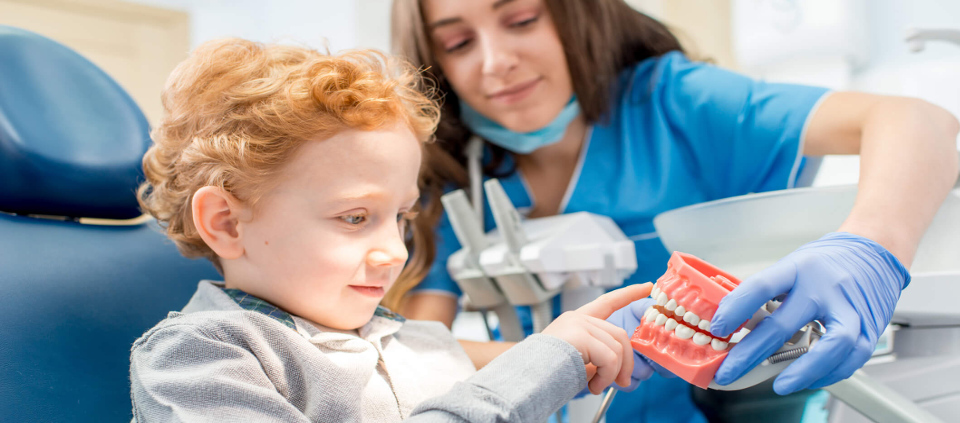Experienced Kids Dentist for Gentle and Effective Dental Care
Experienced Kids Dentist for Gentle and Effective Dental Care
Blog Article
Pediatric Dental Emergencies: What Moms And Dads Need to Know for Quick and Effective Treatment
In the world of pediatric health care, dental emergency situations can develop suddenly, leaving moms and dads unclear of just how to handle the circumstance efficiently. Understanding the indications, sorts of injuries, and immediate actions to take can make a significant distinction in the end result for a kid's dental health. With a fast and suitable action, parents can reduce potential long-lasting repercussions and guarantee their youngster obtains the necessary treatment promptly. By being prepared and informed, moms and dads can play a crucial role in safeguarding their kid's oral well-being.
Indicators of Pediatric Dental Emergencies
When analyzing pediatric oral emergency situations, it is critical for moms and dads to be watchful for specific indications indicating possible major concerns. Among the primary indicators of an oral emergency situation in children is persistent tooth pain that is not reduced by non-prescription discomfort medicines. This can show a hidden infection or damage that requires instant attention from a dental professional. Swelling in the gum tissues, face, or jaw area is one more warning that ought to not be ignored, as it can be a sign of an abscess or various other major oral problem.

Common Types of Dental Injuries
Usual kinds of oral injuries in kids typically result from crashes or sports-related tasks that can result in various kinds of trauma to the mouth and teeth. One usual oral injury is a fractured tooth, which can vary from a minor chip to a more extreme break including the internal layers of the tooth. One more regular injury is a knocked-out tooth, where instant activity is important to increase the opportunities of saving the tooth. Youngsters may also experience oral injuries like tooth intrusion, where the tooth is pushed right into the jawbone, or avulsion, which is the total variation of a tooth from its socket. Additionally, oral injuries can consist of luxation, where the tooth is removed yet not completely knocked senseless, or soft tissue injuries to the gum tissues, lips, or tongue. It is vital for parents to be conscious of these usual kinds of oral injuries to provide affordable dental office timely and appropriate care in instance of emergencies.
Immediate Emergency Treatment Measures
Upon coming across a pediatric oral emergency situation, swift and appropriate very first help measures are important to alleviate pain and avoid additional difficulties. For a knocked-out tooth, advise the youngster to gently rinse the tooth with water, attempting not to touch the origin, and area it back in the outlet when possible. If re-implantation is not practical, save the tooth in a container of milk or the youngster's saliva until getting to the dental professional. In situations of a damaged or broke tooth, wash the mouth with cozy water and use a cool compress to lower swelling. A bitten lip or tongue need to be cleansed delicately with water, and a cold compress can help reduce pain and decrease swelling. For objects stuck between teeth, stay clear of making use of sharp devices and rather urge the kid to carefully floss to remove the thing. In all instances, it is important to get in touch with a pediatric dental professional immediately for additional assessment and treatment.
When to Seek Expert Assistance
Seeking punctual dental treatment from a pediatric expert is vital in dealing with potential difficulties developing from pediatric dental emergency situations. Parents need to seek specialist aid right away if their youngster experiences extreme tooth pain, more info here face swelling, bleeding that does not quit, a knocked-out long-term tooth, or any kind of trauma to the mouth or face. These indicators indicate a significant dental concern that needs prompt interest from a pediatric dentist.
Furthermore, if a youngster suffers persistent tooth sensitivity to warm or cold, problem eating or ingesting, or indications of infection such as pus around the periodontals, parents must not postpone in seeking expert oral treatment. These symptoms might indicate underlying oral problems that need to be resolved promptly to stop more problems.
In cases of dental emergencies, it is important for parents to get in touch with a pediatric dental expert asap to make certain correct view medical diagnosis and therapy - children dentist. Delaying professional help can bring about exacerbated oral issues and extended discomfort for the child

Stopping Future Dental Emergency Situations
To reduce the chance of future oral emergency situations, parents need to prioritize constant dental hygiene techniques and routine brows through to a pediatric dental professional for preventative care. Motivating youngsters to brush their teeth twice a day with fluoride toothpaste and showing them the correct technique for two mins each time can considerably reduce the threat of dental concerns. Flossing day-to-day is additionally important to get rid of plaque and food fragments in between teeth, where a tooth brush can not get to. Additionally, limiting sweet treats and drinks can aid prevent tooth degeneration and dental caries.
Normal sees to a pediatric dental expert for check-ups and cleansings are necessary for very early discovery of any possible dental problems. These consultations enable the dentist to monitor the youngster's oral health, supply expert cleansings to eliminate plaque and tartar buildup, use fluoride treatments for included security, and deal assistance on correct oral treatment methods.
Final Thought
To conclude, moms and dads should be mindful of the signs of pediatric oral emergencies, typical sorts of dental injuries, prompt very first aid steps, and when to seek expert help. By taking positive actions to avoid future oral emergencies, moms and dads can make sure quick and efficient treatment for their children. It is essential to remain informed and prepared in order to take care of any type of oral emergency situation that may develop.
Report this page